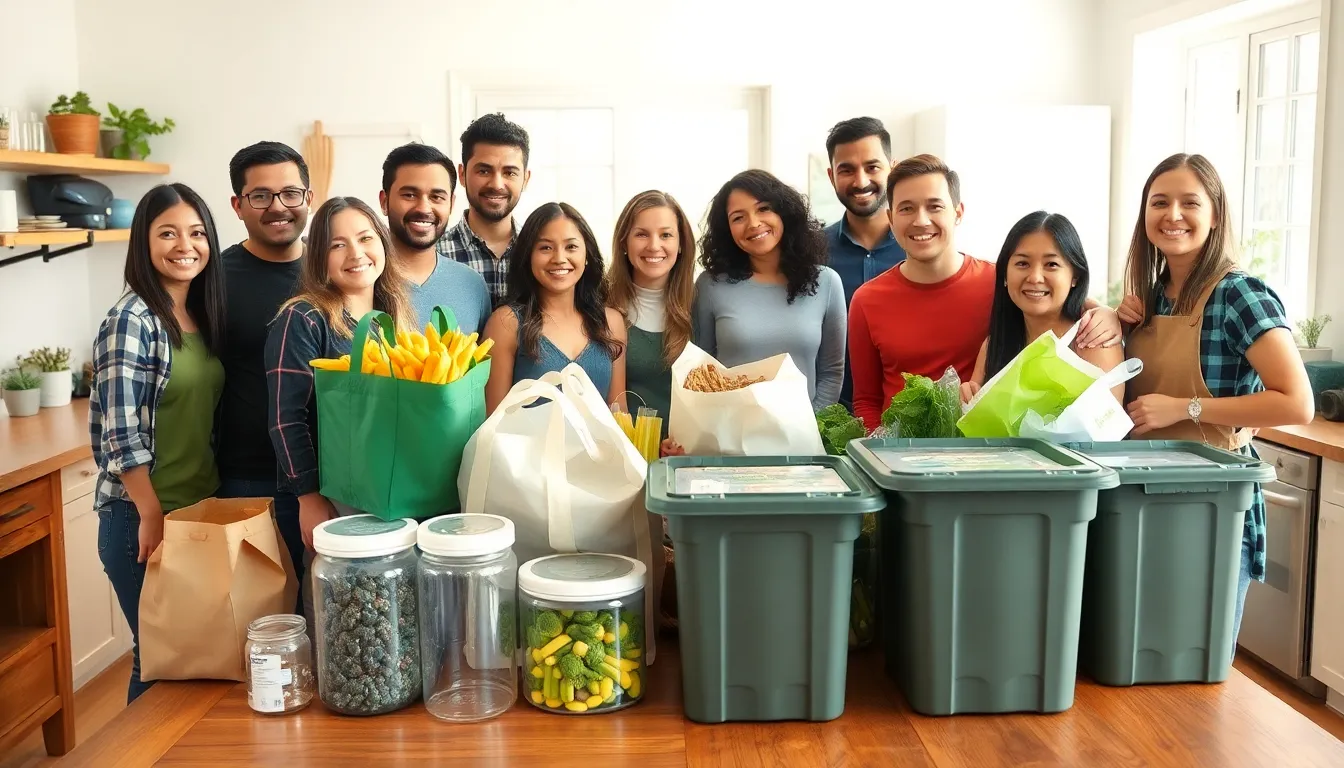In a world drowning in plastic and overflowing landfills, zero-waste living emerges as the superhero we didn’t know we needed. Imagine a life where your trash can is so empty, it feels like a ghost town—spooky, right? But fear not! Embracing this eco-friendly lifestyle doesn’t mean giving up your favorite snacks or wearing burlap sacks. Instead, it’s about making smarter choices that benefit both the planet and your sanity.
Table of Contents
ToggleUnderstanding Zero-Waste Living
Zero-waste living encompasses practices aimed at reducing waste production to the minimum. This lifestyle promotes sustainability while enhancing environmental health.
Definition of Zero-Waste Living
Zero-waste living refers to a philosophy designed to eliminate waste by rethinking production and consumption. Individuals adopt habits that prioritize recycling, composting, and reusing materials. This approach encourages consumers to choose products with minimal packaging and to opt for sustainable alternatives. Living in a zero-waste manner involves making conscious decisions that support waste reduction. Adopting practical strategies allows people to lessen their ecological footprints significantly.
The Philosophy Behind It
The philosophy behind zero-waste living highlights a commitment to environmental stewardship. This mindset focuses on minimizing one’s impact on the planet while fostering a culture of care and responsibility. Additionally, it promotes a circular economy where resources are reused and repurposed rather than discarded. Embracing this philosophy can cultivate awareness regarding the effects of individual choices on the environment. By prioritizing sustainability, zero-waste living creates a collective effort toward preserving natural resources.
Benefits of Zero-Waste Living

Zero-waste living offers multiple advantages that extend beyond personal habits. This lifestyle promotes ecological wellness while improving financial efficiency.
Environmental Impact
Implementing zero-waste practices directly contributes to reducing landfill waste. Each individual adopting this lifestyle can divert an average of 1,200 pounds of waste annually through responsible consumption and recycling. By minimizing plastic usage, the reliance on single-use products decreases, lessening pollution in oceans and natural habitats. Adopting reusable items, such as shopping bags and water bottles, significantly reduces dependence on disposable alternatives. Moreover, composting organic waste enriches soil health and curtails methane emissions, further enhancing air quality. Collectively, these changes foster a more sustainable future and preserve resources for generations.
Financial Savings
Transitioning to a zero-waste lifestyle leads to notable financial benefits. Shifting priorities can result in substantial yearly savings, averaging $500 to $1,000. Choosing quality, durable goods over cheap, single-use items drastically cuts down on replacement costs. Additionally, buying in bulk reduces packaging waste and lowers per-unit prices, making essential products more affordable. Engaging in DIY projects, such as household cleaners or personal care items, adds further savings while minimizing waste. Ultimately, smarter consumption habits lead to less spending and create a more sustainable budget.
Strategies for Adopting Zero-Waste Living
Adopting zero-waste living involves practical strategies to minimize waste effectively. Individuals can implement various initiatives to make significant changes in their daily routines.
Reducing Waste at Home
Identifying areas to reduce waste starts with examining household habits. Opting for reusable containers over single-use items reduces clutter. Composting kitchen scraps diverts organic waste from landfills, promoting soil health. Implementing a three-bin system for recycling keeps waste organized and simplifies efforts. Choosing digital documents instead of paper reduces unnecessary printing. Making small adjustments around the home leads to a noticeable reduction in waste production.
Sustainable Shopping Practices
Prioritizing sustainable shopping contributes significantly to zero-waste living. Selecting products with minimal or no packaging helps reduce plastic consumption. Purchasing in bulk allows individuals to save money while minimizing excess waste. Always carrying reusable shopping bags when grocery shopping eliminates the need for plastic bags. Supporting local farmers and artisans often means accessing fresh produce while reducing transportation emissions. Shopping mindfully fosters eco-friendly habits and strengthens community connections.
Common Challenges and Solutions
Zero-waste living presents unique challenges. Addressing these hurdles effectively can make adoption smoother.
Overcoming Mindset Barriers
Mindset barriers often hinder the transition to zero-waste living. Embracing change remains crucial for success. Many individuals perceive zero-waste as demanding or inconvenient. Overcoming this perception involves focusing on the benefits gained from making eco-friendly choices. Rethinking what sustainability means prompts individuals to feel empowered rather than restricted. Connecting with like-minded individuals fosters support and motivation. Engaging in community workshops or online forums makes sharing experiences easier, reinforcing that affordable alternatives exist.
Practical Tips for Success
Practical tips simplify the adoption of a zero-waste lifestyle. Start by analyzing waste generation patterns in and around the home. Opt for reusable items like bags, containers, and water bottles to minimize single-use products. Implementing a compost system for food scraps cultivates nutrient-rich soil for gardens. Seeking bulk options from local stores reduces packaging waste significantly. Prioritizing quality over quantity can lower overall consumption while extending product lifespan. Joining local zero-waste groups may offer additional resources and ideas, encouraging collaboration within the community.
Embracing zero-waste living is a powerful step toward a more sustainable future. By making conscious choices and adopting eco-friendly practices, individuals can significantly reduce their environmental impact while enjoying a fulfilling lifestyle. This journey not only fosters personal growth but also strengthens community bonds through shared values and goals.
As more people commit to this philosophy, the collective effort can lead to meaningful change. Every small action contributes to a larger movement, creating a ripple effect that inspires others to rethink their consumption habits. Ultimately, zero-waste living is about cultivating a mindset that values resources, promotes sustainability, and nurtures the planet for future generations.








